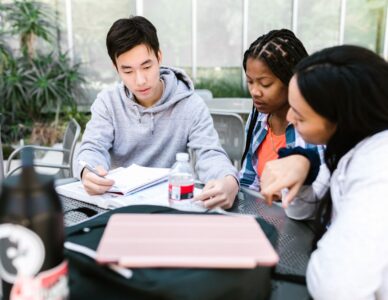PE/BC is an independent, non-partisan organization, however we recognize that IPE/BC Associates and guest authors hold a range of views and interests relative to public schools, education issues, and the political landscape in BC. Perspectives is an opportunity for Associates and others to share their ideas in short, accessible essays.
New Research Casts Doubt on School Cell Phone Bans
March 29, 2025
By Patti Bacchus
Cell phone bans in schools have gained popularity, often championed by politicians who announce them and leave the task of enforcement to teachers and administrators. The best part? These bans typically don’t cost anything. But do they actually work?
While there’s little debate about how distracting cell phones can be—both for students and for many adults—there’s a lack of solid evidence suggesting that banning these powerful devices during school hours is an effective solution to the complex challenges they present.
A recent study out of the UK has been generating significant attention, and for good reason. Published in The Lancet in February, the University of Birmingham study found that students at schools with cell phone bans showed no better outcomes in terms of mental health, physical activity, sleep, or academic achievement.
 This isn’t to say that excessive cell phone use or social media isn’t negatively impacting youth; rather, it suggests that banning phones in schools isn’t the solution politicians often claim it to be.
This isn’t to say that excessive cell phone use or social media isn’t negatively impacting youth; rather, it suggests that banning phones in schools isn’t the solution politicians often claim it to be.
I’m old enough to remember a variety of knee-jerk bans on things kids do. I recall marbles being banned at my elementary school (something about gambling), “clackers” (those balls on strings that had a tendency to send small pieces of glass flying), and even pants for girls (until that glorious day in the late 1960s when the ban was finally lifted and I ran home to change at lunch). In the 1970s, calculators raised alarms in my high school, and the list goes on.
It’s easy for adults to impose bans on children and youth, who have little power and no vote. But just because we can impose a ban doesn’t necessarily mean we should.
Sure, kids checking Instagram, TikTok, or Snapchat during class isn’t conducive to learning. It’s disruptive and distracting. Teachers should absolutely have the authority to set rules in their classrooms, and keeping phones away during lessons generally makes sense—unless they are being used as part of the lesson or assignment.
But given that schools are meant to educate students and prepare them for healthy, engaged lives as productive citizens, are we shortchanging them by opting for simplistic (and often hard-to-enforce) bans instead of more comprehensive, nuanced approaches? Wouldn’t it be better to help them develop healthy tech habits and the ability to set boundaries for themselves, enabling them to use technology constructively?
shortchanging them by opting for simplistic (and often hard-to-enforce) bans instead of more comprehensive, nuanced approaches? Wouldn’t it be better to help them develop healthy tech habits and the ability to set boundaries for themselves, enabling them to use technology constructively?
The Birmingham researchers believe so. Not surprisingly, they found that time spent on phones and social media correlated with negative outcomes, including worse mental wellbeing, decreased physical activity, poorer sleep, lower academic performance, and more disruptive classroom behavior.
However, the researchers concluded that simply banning phones in the classroom won’t solve this problem. Instead, they argue we need to take a more holistic approach to managing overall phone use as a key part of improving adolescent health and wellbeing.
That may require further study to determine the best strategies, as well as funding to educate teachers, parents, and students about managing phone use. Schools and the education system are well-positioned to play a central role in this, but it will take much more than the “headline-grabbing gimmicks” of cellphone bans.
phone use. Schools and the education system are well-positioned to play a central role in this, but it will take much more than the “headline-grabbing gimmicks” of cellphone bans.
I’d also recommend involving students in the process of developing policies and strategies for cell phone use. This could shift the focus from mere compliance with rules to fostering critical, engaged thinking about technology.
This broader, more thoughtful approach may not grab headlines and is unlikely to be cheap, but we owe it to students to consider a solution that will improve their lives both now and in the future. It might just be time to ban the bans.
Patti Bacchus is a public education advocate, commentator, and IPE/BC Board member, who was also the Vancouver School Board’s longest-serving chair, from 2008-2014. She has also served on the Board of the Broadbent Institute. Patti has written extensively about public education issues in the Georgia Straight. She believes that a strong and well-resourced public education system is key to a healthy and just society.


